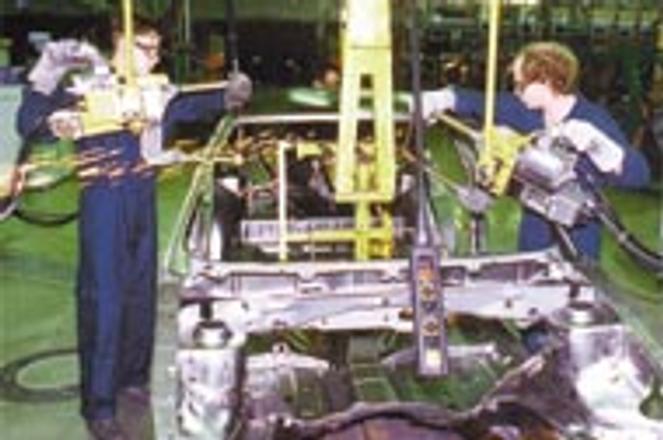Volkswagen's Bratislava plant will soon have a cousin in Martin.Courtesy of Volkswagen Bratislava
A new Volkswagen automotive factory in the northern Slovak town of Martin will begin production in the spring or early summer of 1999, according to an official from the Slovak company building the new plant.
Ján Minár, a spokesman for machinery firm Martinske Strojarne, said that the factory would be built in Martin's industrial park and would produce car parts and components. "It has not yet been decided whether the factory will produce parts exclusively for Volkswagen," Minár said. "The possibility of producing car parts for other car companies still exists."
According to the press agency SITA, the total investment in the Martin project will amount to 5.75 billion Sk ($160 million), of which Slovakia will provide 281 million Sk ($7.8 million). Production volume is predicted to be 12.26 billion Sk ($340 million) annually.
The new factory has been the subject of intense speculation ever since Volkswagen announced plans to expand in June 1998. But final approval for the project must come from VW's board of directors at its next sitting on November 27 in Wolfsburg, Germany. Until the board rules on the new plant, Volkswagen Bratislava officials have been told to keep mum.
"Volkswagen will only release information through official press releases. I will not comment now because we have been given an information embargo from our superiors," said Ula Macher, the director of public relations with Volkswagen Bratislava.
The tension has also affected the Slovak firms close to the project. Milan Novotny, who was on November 1 appointed director of Auto Martin, the company directly handling the new investment, refused an interview with The Slovak Spectator, saying that "information about the Volkswagen production in Martin is confidential."
Minár, for his part, said that "Volkswagen will provide the technology and equipment" for the new factory. "The factory will be a regional project with the objective of cutting down the level of unemployment in the Martin area," he said. "It will employ 650 workers and cover 20,000 square meters." Minár confirmed that Slovakia would provide 281 million Sk of the total investment in the first stage of the project.
Why Martin
"Martin was selected," Minár explained, " because its location close to other factories like ZSNP in Ziar nad Hronom is ideal." Volkswagen Bratislava is already being supplied by Martin-area factories like Martinmetal, a.s. (Martin), KLF-ZVL, a.s. (Kysucke Nove Mesto) and ZSNP, a.s. (Ziar nad Hronom). ZSNP, for example, supplies VW with high pressure, aluminium-made die-casts.
David Brown, principal advisor with investment agency SNAZIR, said that Volkswagen had selected the Martin site specifically because "the people there making decisions on investments move quickly."
Stanislav Bernard, mayor of the city of Martin, said that VW's decision to locate in his town was not the result of any financial encouragements given to the firm by city council. While the city had provided land in 1998 to the Danish shoe firm Ecco at one Sk (3 cents U.S.) per square meter, the Volkswagen factory was exclusively the province of Martinske Strojarne. "It's not our matter," Bernard said.
Volkswagen, of course, is not an average foreign investor. According to Stanislav Tarnovsky, a top official with the Slovak Metalworkers Federation, VW's current factory in Devinská Nova Ves outside Bratislava "accounts for half of the country's machinery production."
In 1997, 40,000 automobiles were manufactured at Volkswagen Bratislava, but the company decided in 1998 to increase this figure threefold to 120,000, a mark that is now sure to be surpassed. The Devinska Nove Ves factory currently puts out around 500 cars per day, but VW Bratislava intends to up this rate to 1,000 daily.
Brown said that Volkswagen had an ideal location in Slovakia because the country afforded cost-efficient production and room for quick increases in capacity.
The VW production hikes have paid financial dividends. "Volkswagen started out as an limited company with 200,000 Sk ($5,500) capital," said Martin Kabát, a stock analyst at brokerage firm Slavia Capital. "But two months ago, they became a joint stock company, with registered capital of 1.98 billion Sk ($55 million)." Expected turnover for 1998 is 55 billion Sk ($1.53 billion).
In spite of the high Slovak production figures, Volkswagen does not have a particularly high share of the Slovak consumer auto market, placing third behind Škoda and Daewoo. In fact, only 0.5% to 1.0% of the VW cars manufactured in Slovakia are sold on the Slovak market, while 96% is exported to the west, according to VW Bratislava supervising manager Ula Macher
Last year, Volkswagen invested 110 million DEM in new technology and equipment for the purpose of increasing productivity in the Bratislava factory.
Additional reporting by Soňa Bellušová


